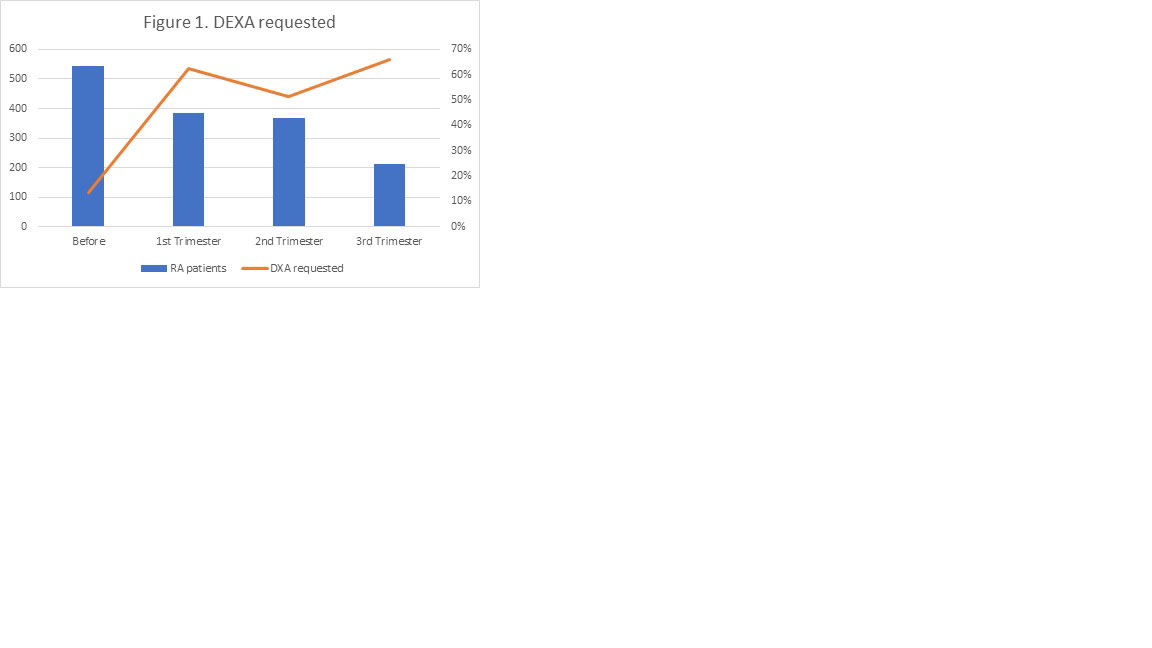Session Information
Date: Tuesday, November 12, 2019
Title: Osteoporosis & Metabolic Bone Disease – Basic & Clinical Science Poster
Session Type: Poster Session (Tuesday)
Session Time: 9:00AM-11:00AM
Background/Purpose: Osteoporosis is a generalized skeletal disorder characterized by compromised bone strength and deterioration of quality, often leading to fragility fractures (1). People with rheumatoid arthritis (RA) are at increased risk of osteoporosis for many reasons (inflammation, use of glucocorticoids, inactivity, etc.) (2). Dual-energy x-ray absorptiometry (DEXA) is the recommended test for osteoporosis screening among patients with RA (3). As part of the “Integral Attention Program in Rheumatologic Patients” a program of “Bone Health” was developed. The purpose of this study is to describe the screening strategies implemented as part of this program and the results after implementation.
Methods: An algorithm was developed for the diagnosis and treatment of patients with risk factors for osteoporosis and was distributed among all the rheumatology fellows in the rheumatology clinic of the University Hospital “Dr. José Eleuterio González” in Monterrey, Mexico. To evaluate the diagnosis implementation of these algorithm among RA patients, the electronic medical record (EMR) was consulted from February 2018 to January 2019 and data was grouped in trimesters (one trimester before the implementation and the next three afterwards) to get the number of DEXA requested among RA patients. To evaluate the accomplishment of requested DEXA, we obtained the number of reported DEXA registered in the EMR and divided between the number of requested DEXA the last trimester. From the total of RA patients every trimester, we subtracted the number of DEXA requested the last trimester. The results are reported as frequency and percentage.
Results: Before the Bone Health program was applied, of the 543 RA patients consulted, only 73 (13.5%) DEXA studies were requested. During the first trimester of the program from 384 RA patients, 240 (62.5%) DEXA were requested and 44 (60.2%) were reported. During the second trimester among 369 RA patients, 190 (51.5%) DEXA were requested and 146 (60.8%) were reported. Finally, during the third trimester among 211 RA patients, 139 (65.8%) DEXA were requested and 114 (60%) were reported. (Table and Figure 1).
Conclusion: The development and implementation of a bone health program with a systematic methodology and the diffusion of these strategies among the rheumatology fellows improved three-fold osteoporosis screening. We should continue working to guarantee that all the patients with risk factors for osteoporosis get a complete evaluation.
To cite this abstract in AMA style:
Figueroa-Parra G, Pineda-Sic R, Rodriguez-Hinojosa J, Gamboa-Alonso C, De-Leon-Ibarra A, Riega Torres J, Hernández-Galarza I, Galarza-Delgado D, Skinner Taylor C. Results of the Implementation of a Bone Health Program in Patients with Rheumatoid Arthritis to Improve the Evaluation of Osteoporosis [abstract]. Arthritis Rheumatol. 2019; 71 (suppl 10). https://acrabstracts.org/abstract/results-of-the-implementation-of-a-bone-health-program-in-patients-with-rheumatoid-arthritis-to-improve-the-evaluation-of-osteoporosis/. Accessed .« Back to 2019 ACR/ARP Annual Meeting
ACR Meeting Abstracts - https://acrabstracts.org/abstract/results-of-the-implementation-of-a-bone-health-program-in-patients-with-rheumatoid-arthritis-to-improve-the-evaluation-of-osteoporosis/


